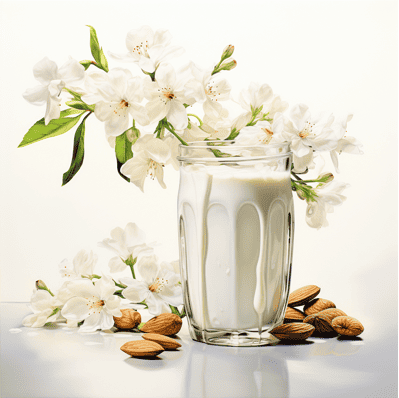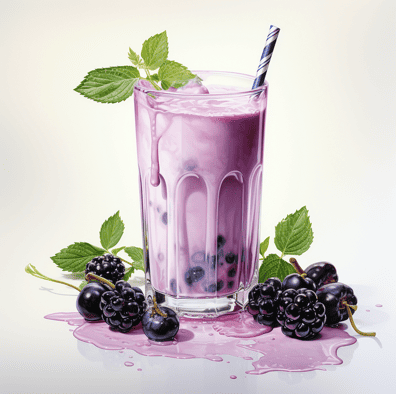
Don’t want to read the whole post?
Almond milk offers a healthier non-dairy alternative to cow’s milk, which is known to promote acne (especially skim milk). Almond milk may promote healthier skin with its vitamin content.
You’ll also love:
Cashews and Acne: Snackable Delights or Skin Saboteurs?
ABOUT ME
Be beauty. Be plant-based!
As a former Registered Nurse and avid plant-muncher, I’m in love with how simple plant-based foods make it so easy to be beautiful!

Sophie has struggled with acne for years, and yet again she is reading for ways to improve her skin and her overall health. One suggestion that has caught her attention is switching from dairy milk to almond milk. Is almond milk good for acne? The idea appeals to her, as almond milk is known for its various health benefits. However, there is a nagging concern in the back of her mind. Sophie wonders if instead of creating clear skin, almond milk might potentially worsen her skin condition.
Skip to: Nourishing from Within: How Almond Milk’s Nutrients Benefit Acne-Prone Skin
She sits at her kitchen table, contemplating her options. With her laptop open, Sophie delves into her research, trying to find answers to her dilemma. Dairy milk, particularly skim milk, is associated with acne breakouts in some individuals due to its hormonal components leading to hormonal imbalance. On the other hand, almond milk is a plant-based alternative that is free from those hormones. Sophie’s excitement grows as she reads about the potential benefits of almond milk for her overall health.
Skip to: The Hormonal Connection: Almond Milk vs. Regular Milk for Acne
However, as she scrolls through online forums and articles, she comes across conflicting anecdotes from people who claim that almond milk has exacerbated their acne. Doubt creeps into Sophie’s mind, and she feels torn between her desire for a healthier lifestyle and her concern for her skin.

Seeking clarity, Sophie decides to consult a dermatologist. During her appointment, she discusses her concerns and desire to switch to almond milk. The dermatologist explains that while certain individuals may experience acne flare-ups due to various factors, including diet, it is not a universal reaction. In fact, almond milk could potentially be beneficial for her skin as it is rich in vitamin E, which has antioxidant properties that can support skin health.
Armed with this information, Sophie feels reassured. She realises that everyone’s body reacts differently, and what works for one person may not work for another. She makes the decision to give almond milk a try, while keeping a close eye on her skin’s response. Sophie understands that it might take time to see any changes and that a holistic approach to skincare, including a balanced diet and proper skincare routine, will play a significant role.
Skip to: From Plant to Glass: How Almond Milk Can Enhance Your Wellbeing
With a renewed sense of confidence, Sophie ventures to the grocery store, eager to explore the world of plant-based milk alternatives. She picks up a carton of almond milk, excited about her first cup of almond milk and the possibilities it holds for her health journey. As she walks towards the checkout, Sophie feels a sense of empowerment knowing that she is taking steps towards a healthier lifestyle, all while being mindful of her skin’s unique needs.
Skip to: Which type of almond milk is best for me?
Nourishing from Within: How Almond Milk’s Nutrients Benefit Acne-Prone Skin
Almond milk is a simple. plant-based milk alternative. All you need to do is blend almonds with water and straining the mixture. It offers several potential advantages for skin health due to several skin-clearing nutrients.
Fatty Acids
Almond milk contains healthy fats, including omega-3 and omega-6 fatty acids. These fats possess anti-inflammatory properties that can potentially help alleviate skin problems, including acne.
Vitamin E
Almond milk is rich in vitamin E, an antioxidant that supports skin health. Vitamin E helps protect the skin from damage caused by free radicals and promotes skin repair and rejuvenation.
Vitamin D
While almond milk is not a significant source of vitamin D, it is often fortified with this nutrient. Adequate vitamin D levels are essential for overall skin health and may positively influence acne management.
The Hormonal Connection: Almond Milk vs. Regular Milk for Acne
Dairy milk is implicated in acne breakouts for some individuals, as its hormones can disrupt the hormonal balance in the body and potentially contribute to the development of hormonal acne. For those with lactose intolerance or dairy sensitivities, dairy milk may trigger skin problems.
Cow’s milk has long been associated with acne breakouts, particularly for those with sensitive or acne-prone skin. Dairy milk contains hormones that can disrupt the body’s hormonal balance, potentially triggering or exacerbating acne. Milk products are also factors in acne, especially skim milk.
What about the oestrogrens?
Almonds themselves, as a plant-based food, do not contain oestrogen and therefore don’t impact your oestrogen levels. Oestrogen is a hormone primarily found in animal products, including dairy milk, as it is naturally produced by lactating mammals.
Almonds do contain phytoestrogens, which are naturally occurring compounds found in certain plant-based foods. Phytoestrogens are a type of plant compound that can mimic or weakly bind to oestrogen receptors in the body. However, it’s important to understand that the effects of phytoestrogens on human health are quite different from those of the oestrogen produced by the human body or found in animal products.
So what are phytoestrogens?
Phytoestrogens have been a topic of scientific interest, and research suggests that they can have both oestrogenic and anti-oestrogenic effects in the body. This means that they can either weakly mimic oestrogen or actually block the effects of oestrogen, depending on various factors such as the concentration of phytoestrogens, the individual’s hormonal status, and the specific receptors involved.
Contrary to popular misconceptions, consuming foods that contain phytoestrogens, including almonds, is generally not considered harmful to health. In fact, they are often associated with potential health benefits. Some studies have suggested that phytoestrogens may have protective effects against certain hormone-related cancers, such as breast and prostate cancers, due to their ability to compete with stronger oestrogens and potentially reduce their effects.

Phytoestrogens, including those found in almonds, are also known for their antioxidant and anti-inflammatory properties, which can contribute to overall health and well-being. Additionally, almonds are a nutrient-dense food, rich in healthy fats, protein, fibre, vitamins, and minerals, making them a valuable addition to a balanced diet.
It’s important to note that individual responses to phytoestrogens may vary. Some people may be more sensitive to these compounds, while others may have no noticeable effects. As with any dietary component, moderation is key. Consuming almonds as part of a varied and balanced diet, rather than in excessive amounts, is considered a prudent approach to reaping their potential health benefits.
If you have specific concerns or existing health conditions, it’s always advisable to consult with a healthcare professional or a registered dietitian who can provide personalised advice based on your individual needs and medical history.
Which type of almond milk is best for me?
When it comes to choosing the best almond milk for your acne, there are a few factors you should consider. While there isn’t a specific brand or type of almond milk that is guaranteed to improve acne for everyone, here are some guidelines that can help you make a better choice for yourself:
Unsweetened Varieties
Opt for unsweetened almond milk to avoid added sugars, which can potentially exacerbate acne. Sugar consumption can increase inflammation in the body, which may contribute to skin issues.
Minimal Ingredients
Look for almond milk brands with minimal ingredients and no unnecessary additives or preservatives. Choosing a product that is as close to natural almonds as possible can help minimise potential irritants.
Fortified with Vitamin E
Check the label to see if the almond milk is fortified with vitamin E. Vitamin E is an antioxidant that can promote skin health and may be beneficial for acne-prone skin.
Organic Options
Consider choosing organic almond milk to reduce potential exposure to pesticides or other chemicals. Some individuals find that reducing exposure to certain chemicals can help improve their skin condition.
Homemade Almond Milk
If you are really concerned about commercial brands throwing in additives, you can also make your own almond milk. Try this recipe for Homemade Almond Milk at From My Bowl, which includes other nut-based milk options too.
Personal Sensitivities
Pay attention to your body’s response. Every individual is different, and while almond milk may work well for many people, it’s important to listen to your own skin. If you notice any adverse reactions or increased acne breakouts after consuming almond milk, it may be worth trying another milk alternative or discussing it with a healthcare professional.
From Plant to Glass: How Almond Milk Can Enhance Your Wellbeing
In addition to it’s skincare benefits this creamy delight can also enhance your overall wellbeing thanks to the following qualities:
Abundance of Nutrients
Almond milk is a nutritional powerhouse. It is packed with essential vitamins and minerals, including vitamin E, calcium, and magnesium. Vitamin E acts as a potent antioxidant, protecting your cells from oxidative stress damage caused by harmful free radicals. Calcium supports bone health, while magnesium plays a crucial role in numerous bodily functions, including nerve function and muscle contraction.
Heart-Healthy Fats
Unlike dairy milk, almond milk is low in saturated fats and cholesterol. It is rich in heart-healthy fats, such as monounsaturated fats and polyunsaturated fats. These healthy fats can help lower bad cholesterol levels and reduce the risk of heart disease when consumed as part of a balanced diet.
Supporting Digestive Wellness
Almond milk is naturally lactose-free and easily digestible, making it a suitable option for individuals with lactose intolerance or sensitive stomachs. The absence of lactose, a sugar found in dairy milk, means that almond milk is gentle on the digestive system and less likely to cause discomfort or bloating.
Maintaining Your Weight
If you’re watching your weight, almond milk can be a beneficial addition to your diet. It is lower in calories compared to whole milk and even some other milk alternatives. By choosing unsweetened varieties, you can enjoy the creamy goodness of almond milk while keeping your calorie intake in check.
Versatility in Culinary Applications
Almond milk’s mild and slightly nutty flavour makes it a versatile ingredient in the kitchen. It can be used as a dairy milk substitute in a wide range of recipes, including smoothies, cereals, baked goods, and savoury dishes. Incorporating almond milk into your culinary creations allows you to enjoy its health benefits while exploring new flavours and textures.
Other Plant-Based Alternatives for Acne-Prone Skin
A common concern when contemplating a plant-based diet is that there is a lack of variety, which is boring. This isn’t the case! Here are some other plant-based milk alternatives to add some variety to your acne skincare routine.
Soy Milk and Skin Concerns
Soy milk is another popular alternative to dairy milk. However, some individuals may experience skin problems due to soy allergies or sensitivities. If soy milk exacerbates acne or other skin conditions, exploring alternatives like almond milk could be beneficial.
Coconut Milk and Acne
Coconut milk, another plant-based milk alternative, does not directly impact acne. However, coconut milk is higher in saturated fats compared to almond milk, and some individuals find that excess dietary saturated fats can trigger inflammation, potentially affecting skin health.
Oat Milk and Acne
Oat milk, a popular plant-based milk alternative, is believed to have potential benefits for acne-prone skin. Rich in fiber and antioxidants, oat milk may help reduce inflammation, which is linked to acne development. It is often free from common allergens like dairy and soy, known to trigger breakouts in some individuals. With its gentle nature and mild flavor, oat milk is a suitable choice for those with sensitive skin.
Other options include cashew milk, rice milk and hemp milk.
Maintaining a Balanced Approach
While almond milk can be a helpful addition to an acne management routine, it’s important to remember that no single food can magically cure acne. A holistic approach, combining a healthy diet, proper skincare, and other lifestyle factors, is key to managing acne-prone skin effectively.
Here are some additional tips for maintaining healthy skin:
- Stay Hydrated: Proper hydration helps flush out toxins, keeps skin supple, and promotes overall skin health. Drink an adequate amount of water each day.
- Consume a Balanced Diet: Focus on whole, nutrient-rich foods like fruits, vegetables, lean proteins, and whole grains. Incorporate a variety of foods that provide essential vitamins and minerals for healthy skin.
- Avoid Trigger Foods: While individual triggers can vary, some people find that certain foods, such as high-sugar or greasy foods, may worsen acne. Pay attention to your body’s responses and adjust your diet accordingly.
- Follow a Skincare Routine: Develop a skincare routine tailored to your skin type. Cleanse gently, moisturise, and use non-comedogenic products. Regularly exfoliate to remove dead skin cells and unclog pores.
I hope you’re feeling confident now, and don’t have any more concerns about whether or not almond milk is good for acne.
Remember, dietary changes alone may not be a definitive solution for acne. It’s crucial to adopt a holistic approach to skincare, including a balanced diet, proper hygiene, regular exercise, and stress management, to support overall skin health. If you have persistent acne concerns, it is advisable to consult a dermatologist for personalised advice and recommendations tailored to your specific needs.
Let me know how you go!